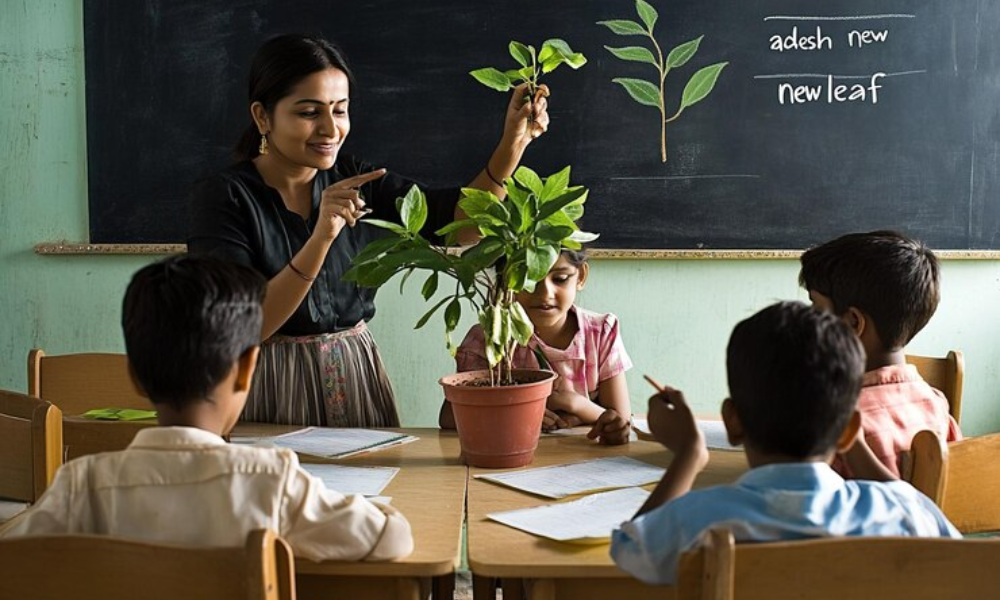Good teachers have the power to transform lives. They inspire students, nurture their curiosity, and help them unlock their full potential. But what exactly makes a teacher great? Drawing insights from leading education experts and surveys of students, this article delves into the key qualities of a good teacher that define an exceptional educator.
Strong Communication Skills

Effective communication is at the heart of great teaching. Among the essential qualities of a good teacher, the ability to explain complex ideas in a clear and engaging manner stands out, making the material accessible and understandable for all students.
Clear and Engaging Explanation
- Simplification of Complex Concepts: One of the good teacher qualities. is the ability to break down difficult ideas into digestible parts.
- Use of Analogies and Examples: Relating lessons to real-world situations is another example of good teacher qualities, making learning more relatable.
Attentive Listening
- Understanding Unspoken Concerns: Among the qualities of a good teacher is the ability to pick up on non-verbal cues and address them appropriately.
- Tailored Teaching Approach: Teachers who possess good teacher qualities. adjust their methods to suit individual student needs.
As Dr. Daniel Tanguay, a senior associate dean at Southern New Hampshire University, explains, strong communication is one of the vital qualities of a good teacher. This helps educators overcome students’ fear and apprehension towards subjects like math. By relating lessons to students’ interests and experiences, teachers can make the material more accessible and enjoyable. “I’m a firm believer in communication in all forms,” says Tanguay. “As a leader, communication is a tool for overcoming fear.”
Empathetic and Caring

The best teachers don’t just impart knowledge—they genuinely care about the well-being and growth of their students. This empathy is among the top qualities of a good teacher, fostering an environment of trust and respect in the classroom.
Understanding Individual Needs
- Personalized Learning: Another of the skills of a good teacher is adapting teaching styles to accommodate different learning preferences.
- Building Student Confidence: Through encouragement and support, which are qualities of a good teacher, they help students overcome their anxieties.
Fostering a Supportive Environment
- Creating Safe Spaces: One of the qualities of a good teacher is creating classrooms where students feel safe to express themselves.
- Building Lasting Relationships: The connections formed between teacher and student often extend beyond the classroom, which is a sign of the good teacher qualities.
Kristine Ducote, an SNHU student pursuing a bachelor’s in criminal justice, emphasizes that “teachers skilled in listening and observing often pick up on what isn’t being said, such as any anxieties a student may have, and can then help the student build their skills and confidence levels.” This highlights some of the critical qualities of a good teacher.
Adaptability and Flexibility
Education is a rapidly evolving field, and the qualities of a good teacher must include the ability to adapt to constant change. Whether it’s incorporating new technologies, adjusting lessons based on student feedback, or responding to shifting curricular requirements, the best teachers exhibit remarkable agility.
Incorporating New Technologies
- Staying Updated with Tools: One of the qualities of a good teacher is the ability to constantly learn and integrate new teaching tools.
- Enhancing Learning Experiences: Exceptional teachers use technology to create more interactive and engaging lessons, which is one of the good teacher qualities.
Adapting to Student Needs
- Adjusting Lesson Plans: Based on real-time feedback, teachers with the qualities of a good teacher modify their approach to meet students’ needs.
- Embracing Change: They view changes in the curriculum or teaching environment as opportunities for growth, another quality that defines the qualities of a good teacher.
“Change is a constant,” says SNHU education professor Dr. Audrey Rogers. “Learning how to adapt and adjust, that’s been one of the skills that’s been most helpful in my career. It’s about keeping my finger on the pulse of who my students are over time and all the trends, standards, and new research, and being able to continually improve.” This adaptability is among the essential qualities of a good teacher.
Collaborative Spirit

Teaching is not a solo endeavor—it involves working closely with a wide range of stakeholders, from fellow educators to administrators to parents. The qualities of a good teacher include understanding the value of collaboration and being skilled at building productive partnerships.
Working with Colleagues
- Sharing Best Practices: Among the qualities of a good teacher is the willingness to collaborate to exchange ideas and improve teaching methods.
- Team Teaching: In some cases, the qualities of a teacher include co-teaching to provide a more well-rounded education to students.
Engaging with Parents
- Regular Communication: Teachers who exhibit the qualities of a good teacher keep parents informed about their child’s progress and any concerns.
- Building Trust: By fostering open lines of communication, which is one of the qualities of a good teacher, they create a support system that benefits the student.
“You really need to be able to fill various roles in order to collaborate effectively,” says Tanguay. “If you already have someone on your team who is going to be the one to critique all of the suggestions made, then you don’t need to join in on that. Instead, maybe you need to be the person who is going to come up with creative ideas. You need to have that flexibility.” Flexibility and collaboration are therefore integral qualities of a good teacher.
Passion for Learning

Great teachers don’t just love their subject matter—they’re also deeply passionate about the act of learning itself. This enthusiasm is among the most important qualities of a good teacher, sparking curiosity and wonder in their students.
Continuous Professional Development
- Lifelong Learning: One of the qualities of a good teacher is the pursuit of additional certifications, attending workshops, and staying informed about the latest research.
- Applying New Knowledge: Teachers who possess the qualities of a good teacher continuously improve their teaching methods based on new insights.
Inspiring Students
- Enthusiastic Teaching: Their love for learning, one of the defining qualities of a good teacher, motivates students to develop a similar passion.
- Encouraging Curiosity: Teachers foster an environment where questioning and exploration are encouraged, a hallmark of the qualities of a good teacher.
“If an educator can truly hear a student, they can learn how to reach them where they are,” says SNHU student Latricia Maddox, who is studying for a bachelor’s in business. “This will open the door for them to receive and learn the lesson that is being taught.” This reflects the true qualities of a good teacher.
Commitment to Student Growth

At the heart of exceptional teaching is an unwavering commitment to student success and growth. These teachers go above and beyond to provide the support and guidance their students need to thrive, demonstrating some of the most crucial qualities of a good teacher.
Tailored Instruction
- Individualized Learning Plans: Teachers who exhibit the qualities of a good teacher create personalized plans to address each student’s strengths and weaknesses.
- Ongoing Feedback: Regular, constructive feedback is one of the qualities of a good teacher, helping students understand their progress and areas for improvement.
Encouraging Perseverance
- Celebrating Small Wins: Teachers recognize and celebrate even minor achievements, a key aspect of the qualities of a good teacher.
- Promoting a Growth Mindset: They encourage students to view challenges as opportunities for growth rather than setbacks, embodying the qualities of a good teacher.
“Great teachers are enthusiastic, friendly, easy-going, able to develop rapport with learners, committed to the growth of their students, approachable, interested in learners as people, and always conscious of their status as role models,” writes Dr. Samy Azer in the Journal of the Royal Society of Medicine, highlighting some of the critical qualities of a good teacher.
Leading by Example

Exceptional teachers don’t just talk the talk—they walk the walk. They model the behaviors and mindsets they hope to instill in their students, which is one of the most impactful qualities of a good teacher.
Demonstrating Resilience
- Handling Challenges Gracefully: Teachers who possess the skills of a good teacher show students how to face adversity with strength and grace.
- Exhibiting Integrity: Upholding strong ethical standards is one of the qualities of a good teacher, setting a powerful example for their students.
Modeling Lifelong Learning
- Pursuing Personal Goals: Teachers openly share their learning experiences, showing students the importance of continuous education, reflecting the good teacher qualities.
- Encouraging Ethical Behavior: Through their actions, they teach students the importance of honesty, respect, and responsibility, key of good teacher qualities.
“Students learn from continuous observation of the ways their teachers handle difficult and stressful situations, how they relate to their patients, and how they deal with ethical and moral issues,” Azer notes. This modeling behavior is among the essential qualities of a good teacher.
Cultivating Good Teachers

Developing the skills of a good teacher doesn’t happen overnight—it requires dedicated, ongoing effort. Educational institutions must support teachers in honing these qualities through professional development, mentorship, and a collaborative culture. By investing in these areas, schools can ensure that teachers continue to grow and evolve, ultimately benefiting students.
Professional Development Programs
- Ongoing Training: Schools should offer regular workshops and courses that focus on enhancing the skills of a good teacher.
- Mentorship Opportunities: Pairing less experienced teachers with seasoned educators can provide guidance and help them develop the essential qualities of a good teacher.
Collaborative Culture
- Fostering Teamwork: Schools should encourage a culture where teachers collaborate and share strategies to enhance the qualities of a teacher within their community.
- Open Communication Channels: Facilitating open dialogue between administration and teachers ensures that educators’ needs are met, allowing them to focus on cultivating the qualities of a teacher.
Conclusion
The qualities of good teacher extend beyond mere technical skills and knowledge. They encompass a range of attributes, from strong communication and adaptability to empathy and a commitment to student growth. These qualities not only help teachers excel in their profession but also leave a lasting impact on their students’ lives. By fostering these qualities, schools can create an environment where both teachers and students thrive, leading to a more enriching educational experience for all.
In summary, the good teacher are a blend of communication skills, empathy, adaptability, collaboration, passion for learning, commitment to student growth, and leading by example. These qualities are vital for shaping the minds and futures of students, making the role of a teacher one of the most influential in society.









